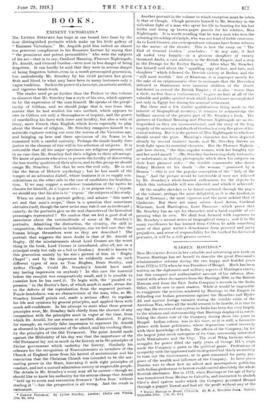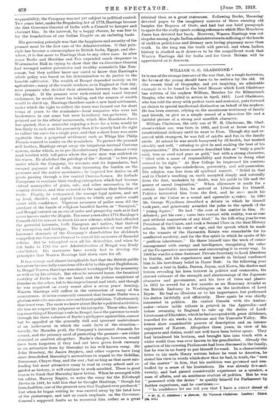WARREN HASTINGS.• Miss MONCKTON JONES in her valuable and interesting
new book on Warren Hastings has set herself to describe the great Proconsul's administrative reforms during the two happy and fruitful years from 1772 to 1774 when he was President of Bengal. Much has been written on the diplomatic and military aspects of Hastings's career, but this compact and authoritative account of his reforms, illus- trated with select documents from the Hastings MSS. in the British Museum and from the East India Company's records in the India Office, will be new to most readers. While it would be impossible to exaggerate the services rendered by Hastings to the Empire in defending our Indian possessions against the Marathas and Ryder Ali and against foreign enemies during the terrible crisis of the American War, when all the world seemed to be hostile, it is true to say that the success of our system in India has been due very largely to the wisdom and statesmanship that Hastings displayed in estab- lishing the direct rule of the Company during those two years in Bengal. Indian reform was in his time, as it is still, a favoutito phrase with home politicians, whose dogmatism varied inversely with their knowledge of India. The affairs of the Company, by far the largest joint-stock enterprise of its time, necessarily interested both Westminster and the City. The rival Whig factions whose struggles for power filled the early years of George M.'s reign made the Company a pawn in the political game. Professions of sympathy with the oppressed natives disguised but thinly an anxiety to turn out the Government, or to gain command for party pur- poses of the wealth and influence of the Company. In later years Dundas was to show how an adroit and unscrupulous politician with Indian preferment to bestow could control absolutely the whole Scottish electorate. But in 1772, when Hastings at the age of forty was transferred from Madras to Calcutta, and instructed to abolish Clive's dual system under which the Company governed Bengal through a puppet Nawab and had all the profit without any of the • Warren Hastings in Bengal, 1772-1774. By Monckten Jones. Oxford: Clarendon Press. it2s. Sd. net.] responsibility, the Company was not yet subject to political controL Two years later, under the Regulating Act of 1773;Hastings became the first Governor-General of India with a Council to hamper and obstruct him: In the interval, by a happy chance, he was free to lay the foundations of our-Indian Empire on an enduring basis.
His governing principle was that the happiness and security of the peasant must be the first care of the Administration. If that prin- ciple has become a commonplace in British India, Egypt, and else- where, it is due more to Hastings than to any other man. In after years Burke and Sheridan and Fox expended muck eloquence in
Westminster Hall in. trying to show that the ex-Governor-General had wronged native potentates and wealthy scoundrels like Nun- comer, but they neither knew nor cared to know- that Hastings's whole policy was based on his determination to do justice to the humble cultivator. The wealth. of Bengal depended mainly on its agriculture ; many of the textile workers, as in England at that day, were peasants who divided their attention between the loom and the plough. If the peasant were rack-rented and taxed beyond endurance, he would desert his holding, and the sources of wealth would be dried up. Hastings therefore made-a new land settlement, under which the right to collect the rents was farmed out for short terms of years to the zernindars—local magnates who were not landowners in our sense but were hereditary tax-gatherers. He pointed out in his official memoranda, which Miss Monckton Jones has quoted, that a zemiudar enjoying a lease for a term would be less likely to rack-rent his peasantry than if he merely had the right to collect the rents for a single year, and that a short lease was more equitable than a perpetual settlement such as Whigs like Philip Francis wanted to confer on the zernindars. To protect the peasant still further, Hastings swept away the iniquitous internal Customs ' system, under which, as in pre-Revolutionary France, almost every road bristled with toll-gates where the poor man was mulcted on his wares. He abolished the privilege of the " dustuk " or free pass, under which the Company, its servants and its dependants; had escaped payment of all tolls, thus increasing the burden on the peasants and the native, merchants ; he imposed low duties on all goods passing through a few central Custom-houses. He forbade Europeans to continue their trading enterprises, which had become virtual monopolies of grain, salt, and other necessaries, in the country districts, and thus restored to the natives their freedom of trade. Finally, he reorganized the corrupt legal system, and set up local, district, and appeal Courts to which any native could. resort with confidence. Vigorous measures of police soon rid the province of the bands of religious banditti known as " Sunnyasi," and Bengal entered on an era of order and prosperity such as it had never known under the Moguls. For some years after 1774 Hastings's Council did its utmost to wreck his new scheme, which had offended the powerful interests, both European and native, that thrived by corruption acrd intrigue. The hard necessities of war and the incessant demands of the Company's shareholders for dividends compelled the Governor-General to curtail his measures of financial reform. But he triumphed over all his difficulties, and 'when he left India in 1785 the new Administration of Bengal was firmly established. His successors have merely had to develop the principles that Warren Hustings laid down once for all.
It is a strange and almost inexplicable fact that the British public has never become fully conscious of its debt to this great Englishman. In Bengal Warren Hastings was almost worshipped by the peasantry as well as by his officials. But when he returned home, the fanatical hostility of Burke on the one hand, and the jealous suspicions of Dundad on the other, led to his impeachment and trial ; and though he was acquitted on every count after a- seven years' hearing, Warren Hastings still suffers in the estimation of many of his countrymen. It is too commonly assumed that because Burke was a glorious writer he was also a wise and honest politician. TJnfortunately that is not true. The more we know about Burke's political activities, the less we respect his judgment or his integrity. Those who, know- ing something of Hastings's rule in Bengal, have the patience to wade through the three volumes of Burke's phi lippi es against him, cremot but be appalled at the generally dull and ignorant malevolence of an indictment in which the main facts of the situation— namely, the Maratha peril, the Company's incessant demands for money, and the primary need of protecting the peasant—are either obscured or omitted altogether. Burke's charges, however, would have been forgotten if they had not been given fresh currency in an attractive form- by Macaulay in his well-known essay. Sir John Strachey, Sir James Stephen, and other experts have long since demolished Macaulay's accusations in regard to the Rohillas, Nuncomar, Cheyte Sing, and the rest ; but so long as that most mis- leading but most attractive essay is read in every school and re- garded as history, it will continue to work mischief. There is good reason to think that Macaulay knew better. When he arranged with his editor, Macvey Napier, to write the essay for the Edinburgh Rein'ew in 1841, he told him that he thought Hastings, " though far from faultless, one of the greatest men that England ever produced." But when he began writing he was carried away by his fatal love of the pieturesque., and • laid so much emphasis on the Governor. General's supposed faults as to represent• him rather as a great
criminal than as a great statesman. Following Burke, Macaulay devoted pages to the imaginary sorrows of those cunning old harpies the Begums of Oude, and had but one brief paragraph to spare for the really epoch-makingenfornis to which Miss Monckton Jones has devoted her book. However, Warren Hastings was not singular among Angle-Indian administrators in Fniffering at the hands of reckless politicians and literary men loving piquancy more than truth. In the long run the truth will prevail, and when Indian. history is studied as it deserves to be the magnificent work that Warren Hastings did for India and for Great Britain will be appreciated as it deserves.



























 Previous page
Previous page